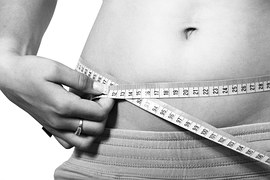Quick Summary of an important Hormone Affecting Weight Loss!’

- Leptin
Leptin is probably the most important master- hormone in our body as leptin impacts on all the other hormones responsible for weight loss and general health. It is most closely linked functionally with insulin but has ties with other hormones responsible for appetite and metabolic balance such as ghrelin and thyroxin. Leptin is produced by adipose tissue and the more fat we have, the more leptin is produced. The importance of this is that leptin informs the brain how much fat we are carrying and the brain will then either stimulate or suppress appetite accordingly, as well as increase or decrease basal metabolism. The higher the fat levels, the higher the leptin, the faster the metabolism and the lower the appetite.
However, as with insulin, too much circulating leptin can lead to leptin resistance, where there is plenty of leptin and the message should be ‘decrease appetite’ and increase metabolism but due to the brain becoming resistant to leptin, this message is not registering. Thus we continue to feel hungry and our metabolism remains low.
Specifically, if we gain weight, leptin increases and the desire to eat is suppressed as well as energy expenditure increased. In other words leptin tells the body there is ample stored food and we don’t need to eat more and our body can burn more energy. Conversely, as weight is lost and fat cells begin to decrease, leptin will tell the body there is potential famine coming and appetite will increase and metabolism will decrease (leptin informs thyroid hormones to step down their cellular energy expenditure levels) to hold on the present amount of stored energy.
Thus fast weight loss:
- Drops basal metabolism
- Increases your appetite
Excessive weight gain:
- More fat
- Increased Leptin
- Leptin resistance
- Increased insulin
- Insulin resistance
The Vicious Cycle!
- Surplus of delicious, carbohydrate dense, high calorie foods, of which we eat too much.
- We ignore the message to stop eating.
- Our body pumps more insulin to try and deal with high calorie intake.
- Our levels of exercise are insufficient to burn off the high calorie intake
- Insulin gives the message to store excess calories as fat.
- Too much insulin leads to insulin resistance.
- Fat levels rise.
- Higher fat levels mean higher leptin production
- Chronic weight gain leads to leptin resistance
- Some foods such as those high in fructose and sugars, promote leptin resistance.
- High stress levels are also linked to leptin resistance.